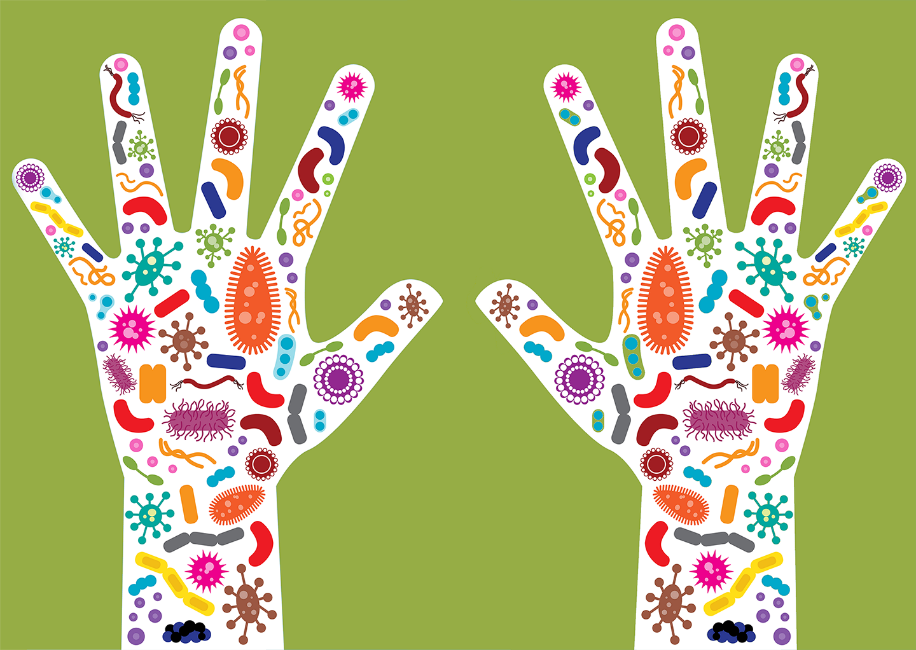GI Health, Patient Blog | May 2 2018
The human microbiome, according to a registered dietitian

There’s bacteria living inside you, and that’s a good thing
Each person is made up of their own unique microbiome, which houses nearly 100 trillion bacteria that outnumber our human cells 10 to 1. About 40 percent of our genetics can be tied to the bacteria that live in our bodies. The human body houses more than 500 different strains of bacteria (with more being discovered all the time).
These bacteria help to increase nutrient absorption, ward off pathogens, and recent studies show that the health of the bacteria in our intestines can directly affect our mood and brain chemistry. In fact, 70 to 80 percent of our immune system is contained within our digestive tract. With results from the latest microbial research, we now know how important gut health is to maintain our long-term health. So, here is a simplified introduction to probiotics and why they’re so important for your long-term health.
What is a probiotic?
The human body houses multiple kinds of bacteria that perform specific jobs, including probiotics. According to the World Health Organization (WHO), probiotics are defined as live microorganisms that, when administered in adequate amounts, confer a health benefit on the host. Basically probiotics = good bacteria. It is important to feed the good bacteria in the gut to help maintain the right balance (symbiosis). When the microbiome is in dysbiosis (imbalance), your body cannot properly maintain its overall health.
How to feed the good bacteria
Like all living things, probiotics need to be fed in order to remain active and healthy and to benefit you as much as possible. What do probiotics eat? Prebiotic fiber, which can help nourish the growth of good bacteria in your gut. It is recommended to consume at least 5 grams of prebiotic fiber per day.
Prebiotic rich foods:
- Garlic
- Onion
- Leek
- Artichoke
- Asparagus
- Wheat bran
- Banana
Along with adequate prebiotic consumption, it is also important to incorporate probiotic rich foods into your diet.
Probiotic rich foods:
- Yogurt
- Kefir
- Cultured vegetables (sauerkraut, kimchi)
- Miso
- Kombucha
- Apple cider vinegar
Research has also revealed that a diet rich in whole, unprocessed foods with encourage the growth of good bacteria in the gut, helping to establish a stronger immune system.
The modern world vs. the microbiome
Unfortunately, many of our current lifestyle choices such as diets high in processed foods, antibiotic usage, and high-stress conditions are quickly depleting our microbiome. The good news is that your microbiome is malleable — meaning that you can improve your gut health with a few simple changes in your daily routine.
Whether you decide to get your probiotics from food or from a supplement (or both), it is critical to understand what you’re ingesting. When you look at a food or supplement label, you will probably notice a list of specific bacterial strains included in the product. This tells you exactly what type of bacteria you are taking and is where you want to look for an abundance of strains especially from the important Lactobacillus, Bifidobacterium, and Streptococcus families. Increasing the amount of strains you consume on a daily basis (via food and/or supplement), the more established and strong your microbiome can become.
Even if you don’t have the time to keep up with all the current microbial research, just remember this — scientists are consistently demonstrating that a healthy microbiome is the foundation for overall health.
Next up: What is gut health?
If you have more questions about gut health, it’s always a great idea to speak with a registered dietitian. Registered dietitians are the only credentialed experts qualified to address your unique health questions.
References:
Fields, Helen. The Gut, Where Bacteria and Immune System Meet. https://www.hopkinsmedicine.org/research/advancements-in-research/fundamentals/in-depth/the-gut-where-bacteria-and-immune-system-meet. Updated November 2015. Accessed April 21, 2018.
Guidelines for the Evaluation of Probiotics in Foods. http://www.who.int/foodsafety/fs_management/en/probiotic_guidelines.pdf. Updated 2002. Accesssed April 25, 2018.
Hao, W.L. Lee, YK. (2004). Microflora of the gastrointestinal tract: a review. Methods in Molecular Biology. 268, 491-502.
Who we are
Dietitians On Demand is the nationwide leader in providing dietitians with jobs they love. If flexibility, competitive pay, a full benefits package, free CPEUs each month and a team dedicated to dietitians sound good to you, apply to our positions today.





